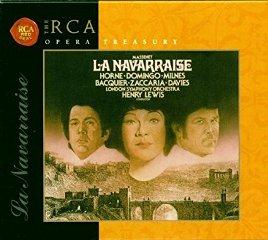Jules Massenet - La Navarraise (Henry Lewis) [1975]
Jules Massenet - La Navarraise (Henry Lewis) [1975]

1 La Navarraise: La Navarraise: Act 1: Prelude 3:12 2 La Navarraise: Act 1: L'assaut à couté cher, messieurs! 2:18 3 La Navarraise: Act 1: Capitaine, je vois que vous appartenez 3:30 4 La Navarraise: Act 1: Je ne pensais qu'à toi 2:42 5 La Navarraise: Act 1: Araquil! - Mon père! 1:38 6 La Navarraise: La Navarraise: Act 1: Depuis deux ans je l'aime! 2:08 7 La Navarraise: La Navarraise: Act 1: Ah! Mariez donc son coeur avec mon coeur! 2:45 8 La Navarraise: Act 1: Etes-vous de la compagnie? 1:32 9 La Navarraise: Act 1: Morts! Les vieux compagnons 4:00 10 La Navarraise: La Navarraise: Act 1: Crénelons les maisons donnant sur la champagne 1:13 11 La Navarraise: La Navarraise: Act 1: O bien aimée 1:39 12 La Navarraise: La Navarraise: Act 1: Anita, la Navarraise? 2:09 13 La Navarraise: La Navarraise: Act 1: J'ai trois maisons dans Madrid 3:07 14 La Navarraise: La Navarraise: Nocturne 3:42 15 La Navarraise: Act 2: Alerte! Alerte! 0:19 16 La Navarraise: La Navarraise: Act 2: Mon argent, mes deux mille douros! 3:07 17 La Navarraise: Act 2: Voici ma dot! 0:47 18 La Navarraise: La Navarraise: Act 2: Blessée, mourant, j'espère! 0:51 19 La Navarraise: La Navarraise: Act 2: Mourir! - Mourir par moi! 4:02 20 La Navarraise: La Navarraise: Act 2: Mon fils! - Père! 1:29 21 La Navarraise: La Navarraise: Act 2: Merci, la bonne vierge 1:44 Anita – Marilyn Horne (mezzo-soprano) Araquil – Plácido Domingo (tenor) Remigio – Nicola Zaccaria (bass) Garrido – Sherrill Milnes (baritone) Bustamente – Gabriel Bacquier (baritone) Ramon – Ryland Davies (tenor) A Soldier – Leslie Fyson (bass) Ambrosian Opera Chorus London Symphony Orchestra Henry Lewis - Conductor
In these days of wine lakes, beef mountains and deserts of dried milk, a double supply of navarraise is probably nothing to write to the Marketing Board about. Still, it is notable. No doubt everybody thought (if anybody gave it a thought at all) that Massenet's sorely tried heroine had gone to her eternal rest along with the age of melodrama which produced her. But who laughs last laughs longest, and she certainly does both of those. So here is RCA blazing away with the guns of Navarraise...and casting it with a generosity that could be mistaken for profligacy.
"Worth waiting for" said the advertisement. And indeed the opera itself...is worth the rediscovery. It opens and closes with, as well as offering several reminders of, a big bold tune in D minor, full orchestra fff, that nowadays would make a fortune for someone as the 'theme music' of an epic film. It continues (and here is an attraction to the makers of 'large-scale' stereo recordings) with tremendous noises of canons and rifles which on the first night, as Bernard Shaw put it, "did heavy execution among the ladies and gentlemen who cultivate their nerves on tea and alcohol"; and it has a grand part for the heroine, especially if she takes a pride in the "voix rauque", the "voix etranglee" and the "crise de nerfs supreme" culminating (though the score does not insist on this) in a peal of mad laughter. Attention is not allowed to wander, and although the tenor does have an aria it is only ninety seconds long, and not even Polonius could complain about that. There are also: Drinking Song (combined with Soldiers' Chorus), Love Duet, Mad Scene and Intermezzo (entitled Nocturne). I suppose that Shaw, who enjoyed himself hugely on that first night, was right when he said that Massenet "has not composed an opera; he has made up a prescription", especially when he adds "and his justification is that it has been perfectly efficacious". That means that, like its prototype Cavalleria Rusticana, it is strongly theatrical, melodious and emotional. The main trouble about the efficacy of the prescription is that Massenet has increased the dose.
The RCA recording does nothing to moderate it. If the CBS version opened fff; this one adds another f for good measure... Henry Lewis has drawn rather finer playing from the LSO than Antonio de Almeida did; the recorded sound has more depth and warmth, and important instrumental figures are given more prominence in relationship with the voices... With Marilyn Horne we know by the end of her first phrase, with its voluptuous chest notes, that (as Micaela sings of Carmen) "elle est dangereuse". Horne is much more in line with what we read of the great Emma Calve in the role, and what presumably Massenet had in mind when he wrote the part for her, filling the score with directions to sing "avec ivresse", "avec élan" and so forth, as well as the incitements to the "hoarse" and "strangled" mentioned earlier... Domingo's rich tone matches Horne's... Milnes has little to do, but is better than Sardinero; Zaccaria is better than Souzay...
"Worth waiting for" then? RCA's sound is rather richer, the conductor's reading rather more studied, the drama rather more vivid...[and] the general feeling is grander. --- Gramophone [11/1975], arkivmusic.com
download (mp3 @320 kbs):
yandex 4shared mega mediafire zalivalka cloudmailru uplea ge.tt








